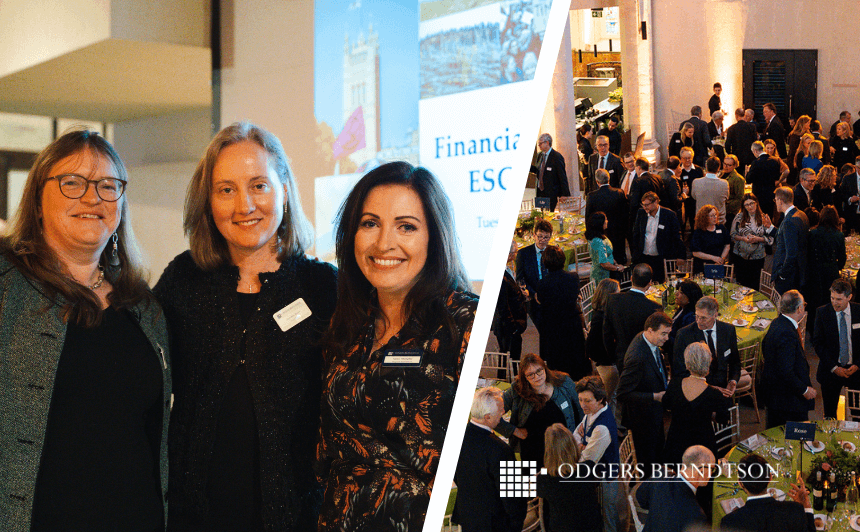Odgers Berndtson’s 2023 Financial Services Dinner explored how environmental and social factors have grown more prominent within the financial services sector.
Those gaining particular momentum include professionalisation through reporting and regulation, impact on the real economy and the challenges to further growth and implementation.
Leading the discussion, and providing insights from within the industry, we were joined by Tracey McDermott, Group Head of Conduct, Financial Crime and Compliance at Standard Chartered and Sandy Boss, the Chief Operating Officer for Global Client Business at BlackRock. The discussion was moderated by Anne Murphy, Partner and Global Head of the Financial Services Practice at Odgers Berndtson.
“In the last couple of years we’ve seen sustainability move from just being talked about, to the hard job of implementation,” Tracey opened with. “But we’re seeing a significant expectation from authorities that business is going to do the heavy lifting, while they already face pressures from almost every other angle.”
“Businesses are focused on how they manage sustainability risk and capture its opportunities; this is manifesting in transformation and change in how businesses are being run,” Sandy added.
Anne noted that the ‘E’ in ESG has firmly gained the spotlight in financial services, translating into risk management strategies and product innovation.
“There’s been an enormous professionalisation of structures in institutions in reporting, data and regulation,” Tracey said.
Sandy noted that many clients, especially in Europe, are also asking for investment solutions with net zero objectives, and are seeking to shape their portfolios accordingly.
The audience heard how the private sector is critical in supporting the energy transition, particularly in making available lending and finance. The private sector cannot do this on its own however; policy and taxation incentives need to help enable the transition as well as drive investment in climate change prevention technologies.
Tracey therefore highlighted that policy implementation needed to be made intelligently: “Regulating financial services to force the economy to change is not a stable mechanism. This just creates friction.”
While public sector impetus might be lagging, interest from the real economy is not.
“Clients are highly engaged and banks are becoming more experienced in conducting transition readiness and stress testing,” Tracey said. “There’s a lot of willingness because everyone sees this is how you achieve a lower carbon economy.” Clear in the conversation was the idea that sustainability initiatives can have a significant impact in enabling transformation. The Just Energy Partnerships rolled out in developing countries, for example, address increasing demand for reliable energy while taking account of the current reliance on fossil fuels.
“Through public and private partnerships, they make sure developing countries can grow, maintaining a standard of living, while tackling climate change,” Tracey said.
Sandy highlighted that providing greater funding at the intersectionality between technology and the energy transition can be highly impactful, to enable innovative new technologies to scale up from proof of concept to full production levels.
Both Tracey and Sandy led a rich and illuminating discussion.
For more information about this talk, contact Anne Murphy, Partner and Global Head of the Financial Services Practice, or get in touch with us here. You can also find your local Odgers Berndtson contact here.
Stay up to date: Sign up here for our global newsletter OBSERVE, and receive the latest news in leadership and top talent, industry insights, and events directly to your inbox.



